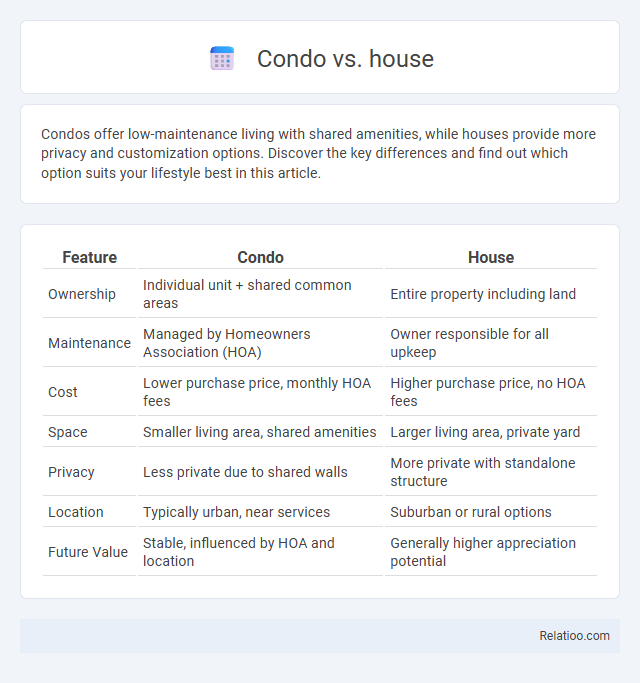Condos offer low-maintenance living with shared amenities, while houses provide more privacy and customization options. Discover the key differences and find out which option suits your lifestyle best in this article.
Table of Comparison
| Feature | Condo | House |
|---|---|---|
| Ownership | Individual unit + shared common areas | Entire property including land |
| Maintenance | Managed by Homeowners Association (HOA) | Owner responsible for all upkeep |
| Cost | Lower purchase price, monthly HOA fees | Higher purchase price, no HOA fees |
| Space | Smaller living area, shared amenities | Larger living area, private yard |
| Privacy | Less private due to shared walls | More private with standalone structure |
| Location | Typically urban, near services | Suburban or rural options |
| Future Value | Stable, influenced by HOA and location | Generally higher appreciation potential |
Introduction to Condo vs House
Choosing between a condo and a house involves understanding key differences in ownership, maintenance, and lifestyle. Condos offer shared amenities and lower exterior upkeep, while houses provide more privacy and control over your property. Your decision impacts financial commitments, community involvement, and long-term investment potential.
Key Differences between Condos and Houses
Condos typically involve shared ownership of common areas and amenities, contributing to lower maintenance responsibilities compared to houses, where owners are fully responsible for the entire property including the yard and exterior. Houses generally offer more privacy, larger living spaces, and greater freedom for customization, whereas condos often provide a more affordable entry point to homeownership with access to community facilities and security features. The choice between a condo and a house depends on lifestyle preferences, budget, and willingness to manage property upkeep.
Purchase Price and Affordability
Condos typically offer lower purchase prices compared to houses, making them more affordable for first-time buyers or those with limited budgets. Houses generally come with higher upfront costs due to larger square footage and land ownership but provide long-term value appreciation and more control over the property. Homeownership costs also include property taxes, maintenance, and homeowner association fees, which can vary significantly between condos and houses, impacting overall affordability.
Maintenance and Upkeep Responsibilities
Condominium ownership typically involves shared maintenance responsibilities, with your homeowners association (HOA) handling exterior repairs, landscaping, and common area upkeep, reducing your direct workload. Houses require full personal responsibility for all maintenance tasks, including roof repairs, yard care, and structural upkeep, potentially increasing time and financial investment. Homeownership in any form demands budgeting for regular maintenance, but condos offer a more hands-off approach compared to the comprehensive demands of house care.
Amenities and Community Features
Condos often provide extensive amenities such as swimming pools, gyms, and concierge services, creating a vibrant community atmosphere ideal for socializing and convenience. Houses typically offer more privacy and larger personal outdoor spaces, but amenities and community features depend heavily on the neighborhood or homeowners association. Your choice between condo and house impacts access to shared facilities and communal living experiences, directly influencing lifestyle and social opportunities.
Privacy and Living Space
Condos typically offer less privacy and limited living space due to shared walls and common areas, while houses provide greater privacy with standalone structures and larger yards. Homeownership of a house allows you to customize both indoor and outdoor spaces extensively, enhancing personal space and secluded living. Considering privacy and living space, your choice between a condo and a house significantly impacts daily comfort and lifestyle flexibility.
Location and Accessibility
Condos often provide prime urban locations with easy access to public transit, shopping, and entertainment, appealing to those seeking convenience and a low-maintenance lifestyle. Houses typically offer more space and privacy situated in suburban or rural areas, with varied accessibility depending on the region's infrastructure and road networks. Homeownership choice between condos and houses largely depends on prioritizing proximity to amenities and ease of commuting versus the benefits of larger living areas and quieter neighborhoods.
Investment Potential and Resale Value
Condominiums typically offer lower entry costs and maintenance fees, attracting first-time buyers and investors seeking rental income, but may face restrictions that impact resale value. Single-family houses often provide greater appreciation potential and flexibility for modifications, enhancing long-term investment gains and market appeal. Your choice between a condo and a house should consider how each aligns with your financial goals, investment horizon, and desired control over property improvements.
Lifestyle Considerations and Preferences
Condo living often suits those seeking low-maintenance lifestyles with shared amenities and urban convenience, while houses provide more privacy, space, and customization options ideal for families or individuals valuing outdoor areas. Your choice hinges on preferences such as desired community interaction, upkeep responsibilities, and proximity to work or leisure activities. Evaluating these lifestyle considerations helps ensure your homeownership experience aligns with your daily needs and long-term goals.
Conclusion: Choosing the Right Home
Choosing the right home depends on Your lifestyle, budget, and long-term goals. Condos offer convenience and lower maintenance costs, while houses provide more space and privacy. Homeownership involves weighing these factors to find the best fit for Your needs and investment potential.

Infographic: Condo vs House
 relatioo.com
relatioo.com